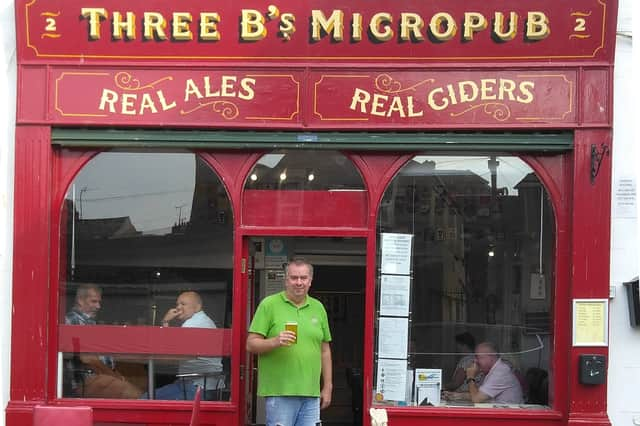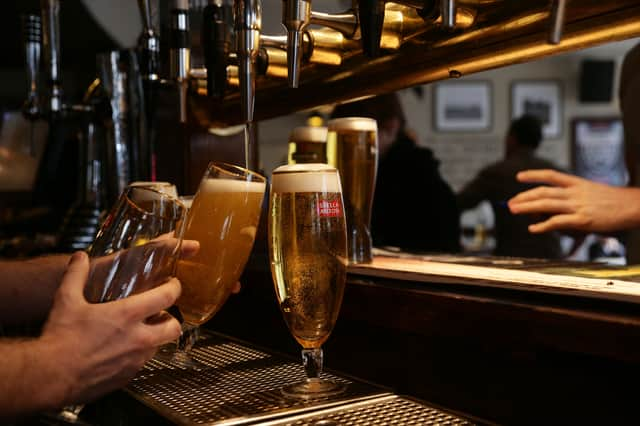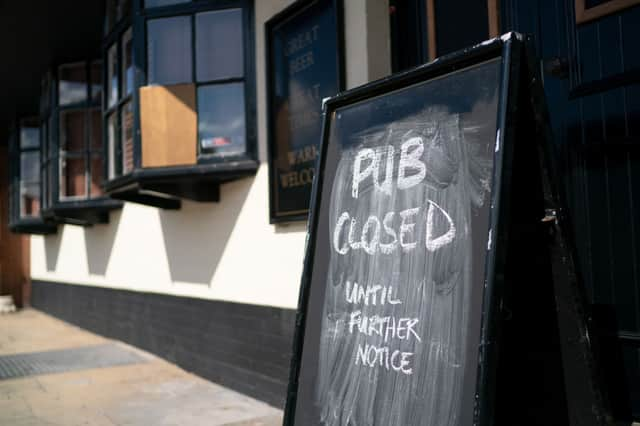Is King Charles’s Coronation make or break for UK pubs? How energy bills and cost of living are harming sector
and live on Freeview channel 276
As King Charles III has the crown placed on his head during his Coronation this weekend, pubs up and down the UK are hoping they will be doing a roaring trade.
The extra May bank holiday weekend will be accompanied by extended opening hours, with the British Beer and Pub Association (BBPA) - a trade body representing the UK’s biggest pub chains and brewers - estimating pubs will make around £120 million from the sale of 62 million pints over the long weekend. The wider hospitality industry expects a £350 million boost, according to pub, bar and restaurant trade association UKHospitality, with hopes of £1 billion in food and drink sales over the course of the month.
Advertisement
Advertisement
But the big bucks on offer this month come as the nation’s pubs face arguably their biggest crisis in living memory. Soaring energy bills, particularly since the government made its business energy support scheme less generous in April, have come at the same time as steep rises in other costs, such as for beer and food.
All the while, consumers are spending less of their money on non-essential items as a result of the cost of living crisis. Near-record inflation and high interest rates have squeezed household incomes to the extent that the Office for Budget Responsibility (OBR) expects UK living standards to fall to a 70-year low.
The BBPA says the situation contributed to the permanent closure of 153 pubs between January and March this year - a rate of almost 12 closures a week. “We have been raising the alarm for months that energy costs are posing an existential threat to pubs across the country and these figures are evidence of that,” says BBPA CEO Emma McClarkin. “Pubs that were profitable and thriving before the energy crisis are being left with no option but to shut up shop.”
Some pubs have even been forced to turn to unconventional methods to keep going. NationalWorld has seen pubs in Cornwall, Manchester and Norfolk who are struggling so much that they have set up internet donation pages in a desperate bid to remain afloat.
Advertisement
Advertisement
So, is the Coronation weekend likely to be a make or break bank holiday for the UK’s pubs? We have looked at Office for National Statistics (ONS) data and spoken to key voices in the industry to find out.
'More than 6,000 pubs have closed since 2010'
While we are talking about a current crisis, pubs have actually been in decline for more than a decade.
Loading....
More than 6,000 pubs and bars closed between 2010 and 2022, according to ONS data. This means there has been a decline of more than 14% from 44,680 to 38,225 over this period (the ONS has rounded figures to the nearest five, meaning these are not exact figures).
Proportionately, the worst hit part of the UK has been Wales, which has lost more than a quarter of its pubs, while Northern Ireland has seen a 22% fall in the number of outlets. In terms of raw numbers, the South East has seen the biggest drop, with 1,045 (17%) fewer establishments operating than there were in 2010.
Advertisement
Advertisement
While the Covid pandemic claimed a significant number of pubs, with 1,280 fewer locals in operation in 2021 compared to 2019, longer-term trends that have fed into the sector’s woes include younger consumers turning away from alcohol and how cheap it is to buy in supermarkets.
Loading....
Although we do not yet have any official data for the situation in 2023, the BBPA says 153 pubs were either demolished or redeveloped in the first quarter of the year - a 60% rise on the same period in 2022. An estimate from CGA by NeilsenIQ and AlixPartners said there had been a 2.5% decline in pub numbers between March 2022 and the same month this year, with 4,593 hospitality outlet closures over this period. They said the rate of independent closures “vastly outstrip[ped]” that for pub chains.
NationalWorld has created a map tool so you can see exactly how many pubs have closed in your local area. Can’t see it? You can view it on the Flourish website here.
Loading....
'Perfect storm' leaves UK pubs on the ropes
The ONS data shows the number of pubs actually rebounded between 2021 and 2022, with 360 more establishments open last year compared to the previous year. But this good news for the sector could be short-lived, judging by the major challenges it faces.
Advertisement
Advertisement
Emma McClarkin, chief executive of the BBPA, says her members are “caught in a perfect storm” and are “struggling” to remain profitable. The biggest factor behind this struggle is energy bills.
Over the 15-months since Russia’s invasion of Ukraine, the cost of energy in the UK has soared. The ONS says gas was 129.4% more expensive year-on-year as of March, with electricity 66.7% pricier. While the government provided a business support scheme over the winter months, this was made much less generous from April as the Rishi Sunak administration has sought to rein in public spending.
This move has provoked fury among some pub operators, some of whom are now paying a much higher figure for their energy after having been forced to bind themselves into fixed-term energy deals to take advantage of the energy bills support scheme.
Dave Hayward, co-owner of A Hoppy Place - a micropub and bottle shop spread over two sites in Windsor and Maidenhead, Berkshire - told NationalWorld he was “angry” about how the government has acted. He says he is paying almost double the rate currently available on the market having signed up to a two-year fixed rate energy contract in September.
Advertisement
Advertisement
He says: “We would not have signed up for a fixed rate contract had I known the support would only last for six months. In September, we were on a variable rate contract that ranged from 20p to 60p per KWh. We fixed at 60p, with a 21p discount coming from the business energy support scheme. Now, you can agree a fix at 34p on the open market.”
Hospitality industry surveys suggest around half of all businesses in the sector had to jump into fixes last September. Mt Hayward adds that the situation had left his two sites struggling to break even, with another 18 months still to run on his fixed deal. “We would have to sell an unsustainable number of pints to break even. It’s the cost of another member of staff.”


Fellow owner Mark Bates, who operates the Three B's Micropub in Bridlington, East Yorkshire, is also concerned about energy bills. He has been on a fixed deal with EDF for three years but his contract is set to end in June. It looks likely to leave him facing a major hike in costs.
He says: “Our usage is currently costing us around £2,000 a year. But [EDF] initially said that if we go onto their standard variable tariff, it would go up to £12,000 a year. We currently pay a 25p standing charge per day, but on the standard variable rate it would rise to £2.50. It would mean we could not afford to operate.”
Advertisement
Advertisement
Having explained his plight to a trade publication, Mr Bates says EDF had offered him “a much better rate”. But he says it would still be double what he was currently paying. He is now facing the dilemma of signing up to a fix for a period of years - a move that could leave him paying more overall if energy prices decline as expected - or going with the variable rate.


Mark Bates runs the Three B's Micropub, which is in the centre of the seaside town of Bridlington. Given its location, he says his trade tends to be seasonal - quieter in the winter and busier in the summer.
But while the number of customers coming through the door remains relatively stable, he says they “are definitely cutting back on their consumption” due to the cost of living crisis.
At the same time, his energy costs are set to double (see main article), staff wages have become more expensive, and the price of the beer he buys is going up. He says a typical pint in his pub is already 30p more expensive than it was at the start of 2022, and envisages he may have to put it up by another 10p this year.
Mr Bates says he is “quietly optimistic” about the May bank holidays, but adds that he doesn’t expect a large increase in trade over the Coronation weekend as he anticipates customers will be celebrating with friends and family.
The publican says it could all come down to the weather. “Bank holidays are extremely weather dependent,” he explains. “For example, Easter Friday was really good but Easter Sunday and Monday were dead. On the Monday, it rained all day, so it was barely worth opening. As long as it stays dry, there’s a lot of opportunity for people to come to us during these extended weekends.”
But even if trade spikes over the month of May, he says his establishment is “at a crossroads”. He explains: “We can’t say we will be open for the next 12 months. We’re planning to review at the end of the year. But we can’t make any guarantees because of all the cost increases.”
Should the Three B's be forced to close its doors, Mr Bates fears that it could have a serious social impact on his regulars. “Our customers are mostly male, retired and live alone. They come here to talk to other people,” he says.
“It’s their social release to come to the pub. They only know each other because of the pub. To not have that would be a backward step for their mental health.”
It is their position at the heart of communities that is the UK pub sector’s great strength. But as Mr Bates’s predicament suggests, even this may not be enough to save them.
Energy cost issues, like those being faced by these two pub owners, pushed the biggest hospitality industry trade bodies - UKHospitality, BBPA and the British Institute of Innkeeping - to pen an open letter to Energy Minister Amanda Solloway calling for government intervention.
The letter, which was published at the end of April, urged the government to crack down on suppliers who they claimed were using “threatening and aggressive sales tactics” and were not passing on wholesale price reductions.
In response, a government spokesperson said: “We have faced a period of exceptional economic challenges, caused by the pandemic and [President Vladimir] Putin’s illegal invasion of Ukraine. Through this period, the government has acted swiftly to provide businesses with an unprecedented package of support which, as of April, has saved them £5.9 billion on energy costs – amounting to over £30 million a day and enabling some to only pay around half of predicted wholesale energy costs.
Advertisement
Advertisement
“Global energy prices have fallen significantly and are now at their lowest level since before Russia’s illegal invasion of Ukraine. The new level of government support reflects this welcome fall in prices, but we will continue to stand by businesses, as we have done over the winter.”


Energy is not the only issue facing pubs. Labour costs are increasing across the country as businesses compete over a smaller pool of workers. At the same time, the cost of everything that goes into brewing beer has gone up in price. According to the ONS, the cost of the average pint of lager has risen by almost 50p to £4.50 between March 2022 and March 2023.
But while pubs have passed some of their cost increases through to their customers, they are hesitant about doing so too much, Dave Hayward says. The reason for this is that their customers are themselves feeling a cost of living pinch, and could be alienated by further price hikes.
“I know what I should be charging for a pint but I don’t think I can because we would lose customers. We can’t risk turning them away,” he says. “We're down a good £1 a pint on an average beer - we're holding prices at the £6 mark but they should be more like £7 to cover our bills.”
Advertisement
Advertisement
As well as energy market reforms, the industry has called for the government to temporarily reduce VAT for hospitality businesses. UKHospitality says such a move would “mitigate against the extraordinarily high energy prices businesses are facing, to stimulate growth and cut costs.” The government did something similar during the Covid pandemic, when it lowered VAT to 5% between 2020 and 2021 to help firms recover.
Meanwhile, national chair of the Campaign for Real Ale (CAMRA), Nik Antona says business rates should also be reviewed: “Business rate relief schemes currently in place in England are due to end in 2024, so the government needs to act soon. Pubs pay a grossly unfair portion of the total business rates bill, and proper reform is the only permanent fix to the issue.”
Dave Hayward, co-owner of A Hoppy Place“These bank holiday weekends may be the difference between success and failure”
So, how much of a make or break is the Coronation weekend likely to be for the UK’s pubs? Well, it depends on who you speak to.
In an interview with the PA news agency in late April, Greene King boss Nick Mackenzie said the occasion would give a “much-needed boost for [the] industry” and “provides a great opportunity” for pubs to show why they are at the heart of British communities.
Advertisement
Advertisement
Despite the “tough backdrop”, Greene King’s 2022 financial results, published on Tuesday (2 May), revealed it had managed to grow its operating profit from £18.6 million to £192.6 million thanks to a 62% uplift in sales.
But these huge earnings are in stark contrast to those of independents, who are struggling to break even. A Hoppy Place’s Dave Hayward says the Coronation and other bank holidays in May could “be the difference between success and failure” for many pubs. He is especially hopeful of a roaring trade over the weekend given one of his pubs is in Windsor, which means any Royal tourism boost could sell extra pints.


Mr Hayward says trade can rise by as much as a third on bank holidays. “Three day weekends tend to work quite well. We get a boost on the Thursday and the Sunday,” he explains. “They don’t save us but they do give us more time. The challenge we have got at the moment is even the very good days are just not good enough.
“I’d say to anyone - support your local independent. The biggest chains will probably pull through this. But independents - the places where you’re on first name terms with your landlord - need your support.”
Advertisement
Advertisement
With prices still soaring at pace across the economy and the cost of living crisis likely to remain with us for a while yet, it may not be possible for consumers to head down to their local as much as they’d like. But what is certain is that May will be a pivotal moment in the fight to save the UK’s pubs.
Comment Guidelines
National World encourages reader discussion on our stories. User feedback, insights and back-and-forth exchanges add a rich layer of context to reporting. Please review our Community Guidelines before commenting.
